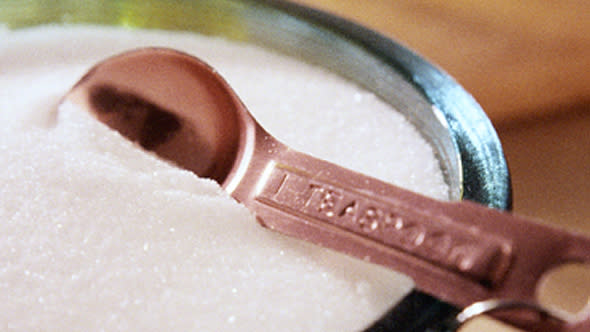Why you should cut sugar, not fat

Pic: Getty
Fat has long been thought of as the healthy body's enemy, and it may well be true that too much of the wrong kind could damage your health.
But recent research has pointed the finger at sugar as the culprit behind growing obesity rates and long-term health problems. Here's why you should consider cutting back on the sweet stuff instead.
Related Searches
In favour of fat
Long the villain of the healthy diet piece, fat has recently been the subject of more positive reports. A recent study claimed that there was no evidence that saturated fat, regarded as 'bad' fat, raised your risk of developing heart trouble. And while trans fats, found in oils, spreads and processed foods such as biscuits and cakes are thought to increase cholesterol levels, it's important to remember that fat is not all bad. In fact it provides the body with energy, vitamins and essential fatty acids, as well as helping us to absorb certain nutrients.
According to the British Heart Foundation, mono and polyunsaturated fats can even help to maintain healthy cholesterol levels. So even though too much fat in your diet is liable to lead to weight gain, and thereby long-term health problems such as type 2 diabetes and heart disease, if consumed in moderation you'll actually be benefitting from its healthier aspects.
The shame about sugar
At first glance, with sugar amounting to four calories per gram as opposed to fat's higher nine calorie per gram content, it may look as though sugar is the better option. And when dietary advice suggested that we cut down on fat, food companies began marketing a plethora of low-fat and fat-free items. But in order to make such items palatable, sizeable amounts of sugar were added, and obesity rates continued to rise.
Weight gain, it seems, is only half the problem. Research has shown that high intakes of added sugars are associated with long-term health problems causing increased blood fat levels and inflammation, potentially leading to coronary heart disease. Furthermore, an analysis of 175 countries over the past decade found that eating an extra 150 calories each day increased the rate of diabetes by 0.1 per cent - but when those 150 calories came from a single can of fizzy pop, the rate rose by 1.1 per cent. In fact, added sugar was found to be 11 times more likely to cause diabetes than calories alone.
While the naturally occurring sugars in fruit or milk are nothing to worry about, the added, and often hidden, sugars in everything from cereals to ready meals, that is the problem. Foods that contain high added sugar levels mean you're consuming plenty of calories, but you're not getting any of the nutrients you might gain low-sugar snacks, and you're unlikely to feel satisfied, which in turn could lead to overeating. What's more, excess fructose cannot be converted into energy, instead becoming liver fat. This can lead to insulin resistance, and consequently serious health issues such as diabetes and heart disease.
%VIRTUAL-AFCSponserAds%
Worse still, scientists in Bordeaux, France, found that the sweet stuff is highly addictive. In animal trials, rats chose sugar over cocaine, even if they were addicted to the latter.
So before you embark on that low-fat or no-fat diet, it's worth checking exactly where your daily calories are coming from - it could be the quality as much as the quantity that's causing the problem.
Have you cut sugar from your diet and why? Leave your comments below...



